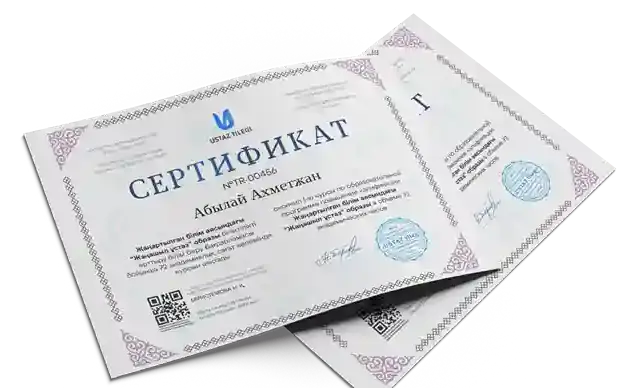|
Long-term plan
unit: 4 THE WORLD OF
WORK
|
School: Tasotkel secondary school
|
|
Lesson
6
|
|
|
Date:
12.12.18
|
Teacher’s name:Baktiyarova A.E
|
|
CLASS: 5
|
Number
present:
|
absent:
|
|
Theme
of the lesson: Chinese
gymnast
|
|
Learning objective (s) that this lesson is contributing
to
|
5.2.5.1- understand
most specific information and detail of short, supported talk on a
wide range of familiar topics;
5.2.6.1- deduce meaning
from context in short, supported talk on an increasing range of
general and curricular topics;
5.2.7.1-
recognize the opinion of the speaker(s) in basic, supported talk on
an increasing range of general and curricular
topics
|
|
Lesson
objectives
|
All
learners will be able to:
|
|
Most learners will
be able to:
• watch a video about a
gymnast from China.
• compare
my life to the gymnast’s.
|
|
Some
learners will be able to:
|
|
Success criteria
|
-
Recognize detailed
information in a short conversation with some
support
-
Figure out the content
of a short conversation with some support
-
Recognize
the opinion of the speaker (s) in basic, supported talk on an
increasing range of general and curricular
topics.
|
|
Value
links
|
Labour
and creativity
|
|
Cross
curricular links
|
Sports
|
|
Plan
|
|
Stages of the lesson
|
Planned activities (replace the notes below with your
planned activities)
|
Teacher’s notes
|
|
Greeting
|
Greet
students; students respond to greeting and take their
places.
Hello, boys and girls! How are
you?
|
Preparation
• Bring photocopies of
the videoscript.
|
|
Warm up
|
• Books closed. Put the
following on the board:
• Alternatively, use the
interactive white board to put the Chinese
characters on the
board.
• Ask: What is this?
Explain that it is how China is written in
Chinese.
• Ask students what they
know about China, e.g. its geography,
climate,
culture.
|
Background
For background on Beijing see the note in Unit 1 on page
42.
|
|
Practice
|
1 • Ask students to
open their books at page 26. Refer them to the photo of the city at
the bottom of the page.
Ask students to
describe it, e.g. It’s very big. It has lots of
people and lots of tall
buildings.
• Students can work pairs
to answer the questions about the
schoolgirl in the
photos.
|
|
|
|
2. 4.2 Play the video
with the sound off.
• Students watch the
video and check their answers to Exercise 1
|
Suggested
answers
1 She’s from Beijing in
China. 2 It’s probably gymnastics.
3 I think it’s a difficult sport.
|
|
|
3. 4.2 Give students
time to read through the six events.
• Play the whole of the
video.
• Students order the
events.
• Check
answers.
|
Answers
5 – 4 – 6 – 3 – 1 – 2
|
|
|
4. 4.2 Ask students if
they can complete any of the gaps before you play the video
again.
• Play the
video.
• Students work alone to
complete the text.
• Students can compare
answers in pairs before you check answers with the
class.
|
Answers
1 12 2 school 3 parents 4 six 5 six 6
doctor
|
|
|
5. 4.2 Give students a
minute to read through sentences
1–5.
• Play the video for
students to complete the exercise.
• Give weaker students a
copy of the script to read as they
watch the
video.
|
Answers
1 F (On Saturday
afternoons, Zhin Yan’s father visits her.)
2 T 3 F (She always
runs in the park.) 4 T
5 F (She gets up at 7 o’clock on Sunday.)
|
|
Your
turn
|
6 • Read out the
example. Elicit or write two or three further
examples to give
students an idea of what to do.
• Ask students to work
alone to make a list how their own
lives differ from Zhin
Yan’s. They should write at least three
sentences.
• Monitor and help as
necessary.
7 • Put students into
pairs.
• Students take it in
turns to ask and answer questions about
how their life compares
with Zhin Yan’s.
|
|
|
Optional
activity
|
• Give students ten
minutes to research facts about China online, e.g.
http://www.bbc.co.uk/news/world-asiapacific-13017879
• Students write five
facts about China. Two of the facts must be
false.
• Students read out their
facts to their partner who tries to identify which of the facts are
false.
|
|
Homework
|
For homework, students
write a profile of a young sports star from another country. They
should find out the following information: name, age, home and
family life, daily routine. In the next class, students share what
they found out with a partner.
|
|
|
Additional Information
|
|
Differentiation - how do you plan to give more support?
How do you plan to challenge the more able
learners?
|
Assessment - how are you planning to check learners`
learning?
|
Health and safety check ICT links
|
|
More support will be given to weaker learners by giving
them a modified worksheets in some tasks with greater
support
|
-through questioning
and the redirecting of questioning in feedback
activities
-through observation in
group and end performance activities
-through formative
task
|
-Health promoting
techniques
-Breaks and physical
activities used.
-Points from Safety rules used at this
lesson.
|
|
REFLECTION
|
Answer the most
relevant questions to reflect on your lesson.
Were the lesson
objectives/learning objectives realistic?
What did
the learners learn? What did/didn’t you like? What was
difficult?
|








